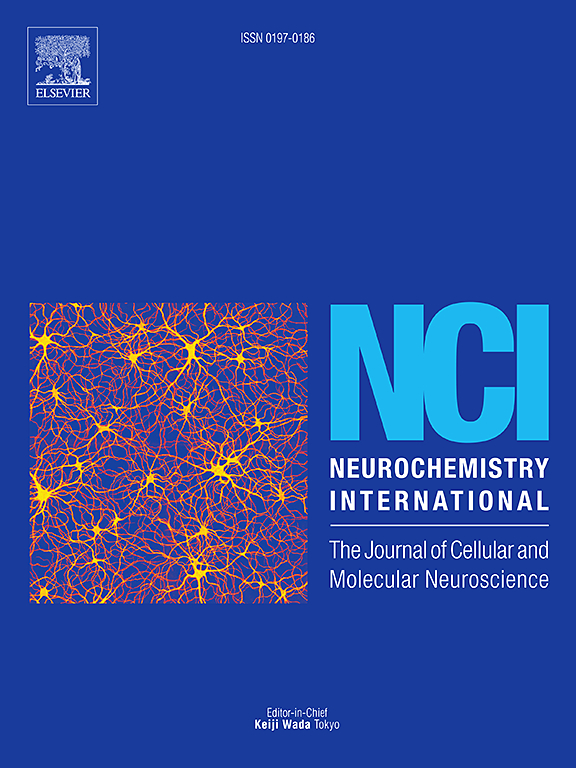Neurometabolite and cognitive changes in hypothyroid patients in response to treatment: In-vivo 1H MRS study
IF 4.4
3区 医学
Q2 BIOCHEMISTRY & MOLECULAR BIOLOGY
引用次数: 0
Abstract
The disturbances in thyroid hormones lead to altered brain metabolism, function, and cognition. Neuroimaging studies have shown structural and functional changes in hypothyroidism. Present study investigates the neuro-metabolite changes in dorsolateral prefrontal cortex (DLPFC) and posterior parietal cortex (PPC) and associated decline cognitive function in hypothyroid patients before and after thyroxine treatment. We performed neuropsychological test and 1H MRS in hypothyroid patients (n = 25) and controls (n = 30). In addition, follow-up data was also collected from 19 patients treated with levo-thyroxine for 32 weeks. The concentration of the neurometabolites were calculated using LCModel. MRS data were analyzed using analysis of covariance (ANCOVA), with age and gender as covariates. A paired t-test was conducted to compare the baseline hypothyroid with the follow-up. Partial correlations were utilised to assess possible associations between neuropsychological scores and neurometabolites with age and gender as covariates. Spearman correlation was performed between thyroid hormone levels and neurometabolites. Hypothyroid patients showed an impairment in delayed recall, immediate recall of semantic, visual retention, recognition of objects memory, attention, and motor function at baseline, which improved significantly after thyroxine therapy. At baseline, patients with hypothyroidism exhibited significantly higher levels of choline compounds (GPC + PCh) [Cho]. No significant normalization of Cho levels was observed, despite achieving euthyroidism with thyroxine treatment. Cho levels showed a positive correlation with TSH in PPC and a negative correlation with T4 in DLPFC and PCC. Cho levels also showed negative correlations with delayed recall, immediate recall of semantic, visual retention memory and MMSE scores. The MRS findings show increased levels of Cho in hypothyroid patients compared to healthy controls. These Cho levels are not reversible within 32 weeks of treatment, suggesting that a longer follow-up may be needed to see if levels can be normalized.
甲状腺功能减退症患者的神经代谢物和认知变化对治疗的反应:体内 1H MRS 研究。
甲状腺激素紊乱导致脑代谢、功能和认知的改变。神经影像学研究显示甲状腺功能减退症的结构和功能改变。本研究探讨了甲状腺功能减退患者在甲状腺素治疗前后背外侧前额叶皮质(DLPFC)和后顶叶皮质(PPC)神经代谢物的变化和相关的认知功能下降。我们对甲状腺功能减退患者(n=25)和对照组(n=30)进行了神经心理测试和1H MRS。此外,还收集了19例左旋甲状腺素治疗32周的随访数据。采用LCModel计算神经代谢物浓度。以年龄和性别为协变量,采用协方差分析(ANCOVA)对MRS数据进行分析。采用配对t检验比较基线甲状腺功能减退与随访。利用部分相关性来评估神经心理学评分和神经代谢物之间可能存在的关联,并将年龄和性别作为协变量。在甲状腺激素水平和神经代谢物之间进行Spearman相关性。甲状腺功能减退患者在基线时表现为延迟回忆、语义即时回忆、视觉保留、物体识别记忆、注意力和运动功能的损害,甲状腺素治疗后显著改善。基线时,甲状腺功能减退患者胆碱化合物(GPC+PCh)水平明显升高[Cho]。尽管通过甲状腺素治疗实现了甲状腺功能亢进,但未观察到Cho水平明显正常化。Cho水平与PPC患者TSH呈正相关,与DLPFC和PCC患者T4呈负相关。Cho水平与语义延迟回忆、即时回忆、视觉保留记忆和MMSE得分呈负相关。磁共振结果显示,与健康对照组相比,甲状腺功能减退患者的Cho水平升高。这些Cho水平在治疗32周内是不可逆转的,这表明可能需要更长的随访时间来观察水平是否可以正常化。
本文章由计算机程序翻译,如有差异,请以英文原文为准。
求助全文
约1分钟内获得全文
求助全文
来源期刊

Neurochemistry international
医学-神经科学
CiteScore
8.40
自引率
2.40%
发文量
128
审稿时长
37 days
期刊介绍:
Neurochemistry International is devoted to the rapid publication of outstanding original articles and timely reviews in neurochemistry. Manuscripts on a broad range of topics will be considered, including molecular and cellular neurochemistry, neuropharmacology and genetic aspects of CNS function, neuroimmunology, metabolism as well as the neurochemistry of neurological and psychiatric disorders of the CNS.
 求助内容:
求助内容: 应助结果提醒方式:
应助结果提醒方式:


